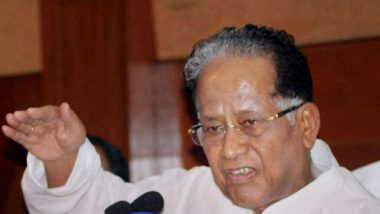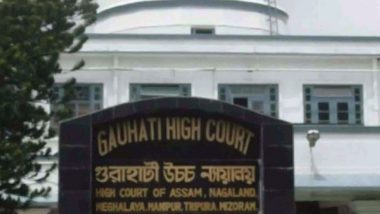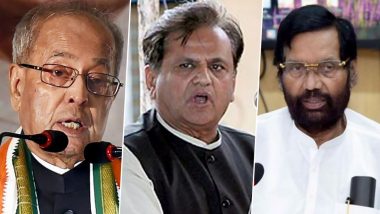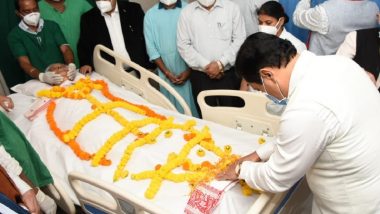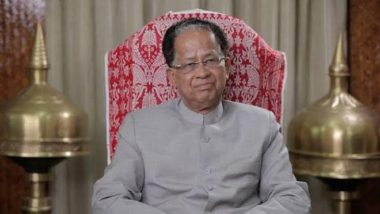New Delhi, Aug 28: People who do not get enrolled in the National Register for Citizens (NRC) in Assam for lack of proof should not be detained in camps like those deemed foreigners by the states Foreigners Tribunals -- but they should have truncated rights: Former Assams Chief Minister Tarun Gogoi did not state this expressly, but as much could be inferred from his suggestions at an interaction with the media here earlier in the week.
These "stateless persons cannot own land" but should be allowed to "do business to a limited extent", the 83-year Congress leader who was Assam's Chief Minister for three terms in a row from 2001, said. He elaborated this as meaning they should be able to earn a livelihood.
There is a real prospect of tens of thousands -- perhaps lakhs -- of Assam residents being declared stateless and losing their rights. These will be the ones filtered out of the four million people who could not get into the draft NRC released at the end of July. The final NRC will be released after their claims and objections are addressed.
They might be incarcerated in liberty-less limbos, like the deemed foreigners, whose plight was documented in a report sent to the National Human Rights Commission (NHRC) in January. The researchers who had authored the report had been deputed by NHRC to visit the detention centres. The NHRC's Special Monitor for Minorities and Communal Violence, Harsh Mander, had also independently sent a report to the NHRC on the same issue. He resigned the position in June to protest the NHRC's inaction, as he put it, on his report.
Mander said thousands of people were languishing in these camps since they were set up in 2010. Families were torn apart. This was a violation, he said, of India's constitution and its obligations under international human rights covenants. In 2002, Mander had quit the Indian Administrative Service after serving in it for 22 years to protest the Gujarat government's failure to prevent the riots in which about a thousand Muslims were killed.
Gogoi said the NRC was not part of the Assam Accord which Prime Minister Rajiv Gandhi had signed with the leaders of the Assam agitation in 1985 to end a six-year stir on the foreigners' issue. He said it was mooted in 1951 for the whole country following the Partition in 1947.
Supreme Court lawyers Sanjay Hedge and Pranjal Kishore write that such a register for Assam was indeed prepared by census enumerators from the census slips of 1951. But it was a secret, administrative document, not open for inspection.
Gogoi says he decided on a pilot project to update the NRC but abandoned it in 2010 after protests because of a large number of exclusions. Hegde and Kishore write that project was begun in 2005 for two revenue circles of Barpeta and Kamrup (Rural) districts.
"It is my baby. I am (sic) a real father. This government is a foster father," Gogoi said about the current NRC exercise. He proposed an alternative: Those on the electoral rolls of 2014 and 2016 should be automatically considered as citizens.
Starting in 2014, the Supreme Court took upon itself the task of updating the NRC in response to a bunch of public interest suits. The updating began in 2014 and about Rs 1,200 crore has been spent on it. Gogoi says it has been implemented in a "haphazard" manner, the officials were not properly trained, and even the Central Government's Standard Operating Procedures for inclusion and exclusion from the register were not accepted by the Supreme Court.
Former Home Secretary G.K. Pillai says putting those identified as foreigners in detention centres would have disastrous consequences both nationally and internationally. He says the objective should be to give all of them citizenship over a period of time. Three-quarters of them should be dispersed across other states so that the burden does not fall entirely on Assam. Till they are made citizens, they should be given work permits but no citizenship or voting rights. Pillai was in the Home Ministry overseeing the implementation of the Assam Accord between 1996 and 2001.
Under the Citizenship Amendment Bill of 2016, illegal immigrants who are Hindus, Sikhs, Buddhists, Jains, Parsis and Christians from Afghanistan, Bangladesh and Pakistan are eligible for citizenship. To become a naturalised citizen, the applicant should have been resident in India in the preceding 12 months and for 11 of the 14 previous years. For the six communities from the three countries, the 11-year requirement is reduced to six.
Assam minister and BJP leader Himanta Biswa Sarma (who was close to Gogoi before switching parties) have been reported as saying that Bangladeshi Hindus will be retained. But Gogoi said the citizenship amendment bill if made law will be struck down because it violates the right to equality.
( This opinion piece is authored by Vivian Fernandes of IANS. The views belong to the author. LatestLY does not take any ownership for the same)
(The above story first appeared on LatestLY on Aug 28, 2018 03:52 PM IST. For more news and updates on politics, world, sports, entertainment and lifestyle, log on to our website latestly.com).













 Quickly
Quickly








